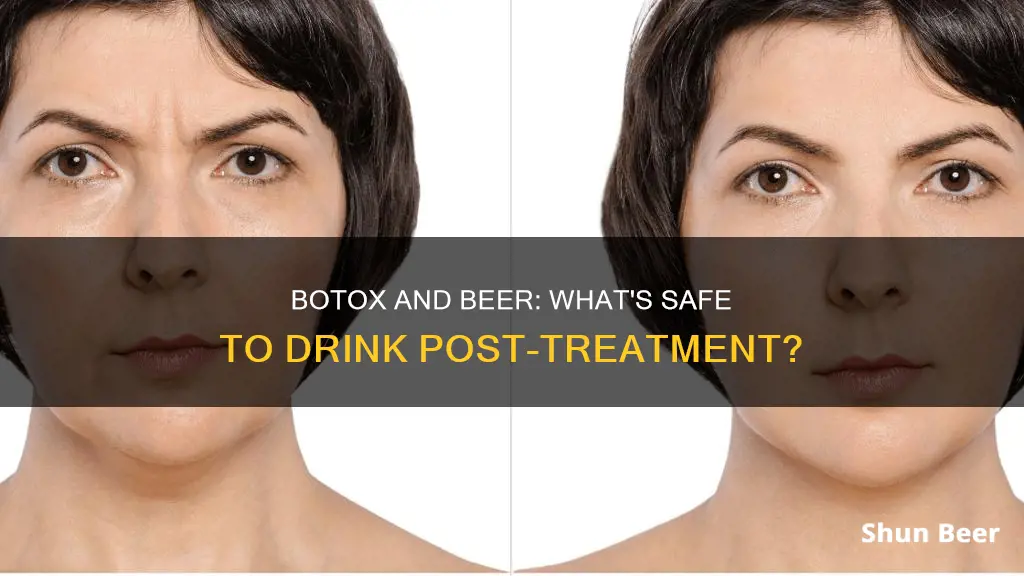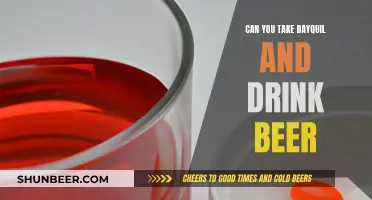
Botox is a popular cosmetic treatment to reduce wrinkles and fine lines. While you can resume normal activities after the treatment, it is recommended to refrain from drinking alcohol for at least 24 hours before and a couple of days after the procedure. Alcohol has blood-thinning properties, which can increase the chances of bruising and swelling at the injection sites. Additionally, alcohol can cause dehydration and dry skin, hindering the overall results of the treatment. Therefore, it is advisable to avoid alcohol consumption for a short period before and after Botox treatment to ensure optimal healing and desired cosmetic outcomes.
Can you drink beer after botox?
| Characteristics | Values |
|---|---|
| Alcohol consumption before botox | Should be avoided for at least 24 hours before the procedure, and ideally throughout the entire week |
| Alcohol consumption after botox | Should be avoided for at least 6 hours after the procedure, and preferably for the first 2 days |
| Reasons for avoiding alcohol | Alcohol is a vasodilator, thinning the blood and increasing the chances of bruising and swelling. Alcohol also dries out the skin, hindering the appearance of final results. Botox may also cause side effects such as dizziness or drowsiness, which could be worsened by drinking alcohol. |
| Alternatives to alcohol | Water, juice, or other non-alcoholic beverages |
What You'll Learn

Alcohol thins the blood, increasing the chance of bruising
Alcohol is a blood thinner and a vasodilator, which means it causes your blood vessels to temporarily relax and expand. This widening increases blood flow throughout your body, including near the surface of your skin. More blood flowing through your vessels means that more blood can escape if a blood vessel happens to rupture. And when the blood vessels underneath your skin break, it causes blood to leak out, resulting in a bruise.
Alcohol also reduces the number of platelets in the blood and makes the platelets you do have less sticky. Platelets are blood cells that rush to the site of an injury and form clots to close wounds and stop bleeding. When you have fewer platelets, or they are less sticky, your blood takes longer to clot, and you are more likely to bruise.
Because of these effects, drinking alcohol, especially in large quantities, can increase your risk of bruising. This is why it is recommended that you avoid drinking alcohol for at least 24 hours before and after getting Botox injections. Botox injections commonly result in bruising at the injection site, and drinking alcohol can increase the chances of this occurring.
In addition to increasing the risk of bruising, alcohol can also cause other complications after Botox injections. Alcohol can cause drowsiness and dizziness, which may be side effects of Botox as well, making it more difficult to identify these sensations as being related to your treatment. Alcohol can also cause dehydration and impact your skin, making the recovery process more difficult and lengthy.
Beer and Augmentin: Safe Mix?
You may want to see also

Drinking after Botox may cause dizziness and drowsiness
While Botox is a very safe and popular cosmetic treatment, there are a few things to consider when it comes to drinking alcohol after your procedure. Firstly, it is important to note that Botox injections may cause side effects such as dizziness or drowsiness. These effects can be worsened by consuming alcohol, so it is generally recommended to avoid drinking after receiving Botox injections.
Alcohol has blood-thinning properties, which can increase the chances of bruising and swelling at the injection sites. This is because alcohol causes blood vessels to widen and relax, leading to increased blood flow and fluid retention. As a result, even a very small puncture that would not usually cause any issues can lead to bruising when alcohol is consumed.
Additionally, alcohol can cause dry skin, especially when consumed in large quantities. This can negatively impact the appearance of your skin after Botox, as dry skin is more prone to cracking.
To optimize healing and get the most out of your injections, it is best to avoid drinking alcohol for at least a couple of days after your Botox treatment. This will help minimize bruising and swelling, and ensure that any side effects such as dizziness or drowsiness are not exacerbated by alcohol consumption.
While there is no definite timeframe for resuming alcohol consumption after Botox, most sources recommend waiting at least 24 to 48 hours. This allows your skin and treated areas to heal properly, reducing the risk of bruising and swelling.
Shotgunning Beer: How to Chug Instantly
You may want to see also

Alcohol can cause skin dryness, hindering treatment results
Botox is a popular cosmetic treatment to reduce wrinkles and eliminate fine lines. It is a safe and effective way to achieve a youthful appearance without surgery and its associated downtime. However, to ensure optimal results and a smooth recovery, there are a few considerations to keep in mind, especially regarding alcohol consumption.
Alcohol can cause skin dryness, which may hinder the desired results of Botox treatment. Alcoholic beverages have dehydrating effects on the skin, leading to a loss of vital fluids and nutrients. This dehydration can result in bloated or puffy skin and can even trigger or worsen certain skin conditions. The drying effect of alcohol contradicts the goal of achieving a youthful, hydrated, and glowing complexion after Botox.
In addition to skin dryness, alcohol consumption can also impact the Botox treatment in other ways. Alcohol acts as a vasodilator, causing blood vessels to expand and increasing blood flow to the skin. This heightened blood flow, particularly near the injection sites, increases the likelihood of bruising and swelling. The combination of Botox and alcohol may exacerbate these side effects, leading to adverse cosmetic reactions.
To minimize the potential risks associated with alcohol consumption after Botox, it is generally recommended to abstain from drinking for at least 24 to 48 hours before and after the procedure. This waiting period allows the body to heal properly, reduces the risk of bruising and swelling, and ensures more noticeable results. By avoiding alcohol, individuals can maintain radiant and hydrated skin, enhance the settling process of Botox injections, and speed up their recovery.
While Botox treatments offer an effective solution to combat signs of aging, consuming alcohol after the procedure may interfere with the desired outcomes. Therefore, it is advisable to prioritize proper aftercare and refrain from alcohol consumption for the recommended period to achieve optimal results and maintain healthy, glowing skin.
Colorado EBT and Beer: What's the Deal?
You may want to see also

Avoid alcohol for at least 24 hours before Botox
It is recommended that you avoid drinking alcohol for at least 24 hours before your Botox treatment. While you can resume your normal activities after the procedure, there are a few precautions to take. Alcohol is a vasodilator, which means it causes blood vessels to dilate or expand, increasing blood flow to the surface of your skin. This can lead to fluid retention and a higher chance of bruising and swelling, especially at the injection sites. By avoiding alcohol before your treatment, you can minimise the risk of these side effects and allow your skin to heal optimally.
Additionally, alcohol has blood-thinning properties, which further increase the likelihood of bruising. Even a small puncture that would typically not cause a mark can lead to bruising when you have been drinking alcohol, as the tiny blood vessels are more prone to rupture. Therefore, it is crucial to avoid alcohol before your Botox treatment to reduce the chances of bruising and promote better healing.
While there is no definitive rule on how long to wait after the treatment, it is generally recommended to avoid alcohol for at least a day or two. This is because your skin and the treated areas will still be healing, and thinning the blood with alcohol consumption can prolong the recovery process by increasing the bruising effect.
Furthermore, Botox injections may cause side effects such as dizziness or drowsiness, which can be worsened by alcohol consumption. By abstaining from alcohol after your treatment, you can ensure that any sensations of dizziness are accurately attributed to the treatment rather than the effects of alcohol.
In summary, it is important to avoid alcohol for at least 24 hours before your Botox treatment to reduce the chances of bruising and swelling and promote optimal healing. By following this recommendation, you can ensure that you achieve the desired results from your treatment and maintain the best possible skin condition.
Workplace Attire: Beer Shirts, Appropriate or Not?
You may want to see also

Alcohol consumption may cause swelling and other complications
Alcohol consumption can also lead to fluid retention, which further increases the possibility of bruising and swelling. In addition, alcohol can cause dry skin, which is not ideal before a Botox appointment as the procedure is intended to enhance the appearance of your skin. Dry skin can hinder the final results, as it is more prone to cracking.
While the exact amount of time to wait before drinking alcohol after Botox is not definite, it is generally recommended to avoid alcohol for the first 6 hours and preferably the first 2 days after treatment. This is because the treated areas will still be healing and prone to bruising, and thinning the blood with alcohol consumption will only prolong the recovery process.
It is worth noting that Botox injections may also cause side effects such as dizziness or drowsiness, which could be worsened by drinking alcohol. Therefore, it is generally advised to avoid alcohol consumption before and after Botox treatments to ensure optimal healing and results.
Beer Distribution in Pennsylvania: A Unique System
You may want to see also
Frequently asked questions
It is not recommended to drink beer or any alcoholic beverage after getting Botox. Alcohol has blood-thinning properties, which can make your skin more prone to bruising and swelling. It is ideal to wait at least 24 hours and preferably two days before consuming alcohol after your Botox treatment.
Alcohol can cause your blood vessels to widen and increase blood flow, leading to swollen soft tissue. Additionally, alcohol can cause dry skin, which can hinder the appearance of your final results. It is best to avoid drinking to ensure optimal healing and recovery.
It is recommended to wait at least 24 hours and preferably 48 hours after your Botox treatment before consuming alcohol. This allows your skin and treated areas to heal and reduces the risk of bruising and swelling.
Yes, Botox injections may cause side effects such as dizziness or drowsiness, which can be worsened by alcohol consumption. Alcohol can also affect your skin, making it dry and lengthening the recovery process.







